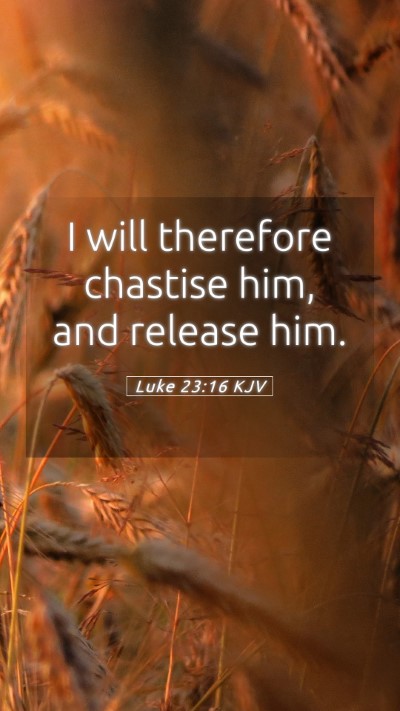Understanding Luke 23:16
Luke 23:16 states: "Therefore I will chastise him and release him." This verse finds itself within the narrative of Jesus' trial before Pontius Pilate, where the Governor acknowledges the innocence of Jesus but is faced with the people's demand for His crucifixion.
The significance of this passage is profound in the examination of human justice and divine will. Here, we shall explore the meaning of this verse through insights from public domain commentaries, focusing on Bible verse meanings, interpretations, and explanations.
Commentary Insights
-
Matthew Henry's Commentary:
Henry notes that Pilate's intention was to quell the violence of the crowd while maintaining his own authority. The decision to chastise Jesus demonstrates the paradox of Pilate's role — he recognizes Jesus’ innocence but capitulates to the demands of the populace. This reflects a key theme of the Gospels: the conflict between worldly power and divine truth.
-
Albert Barnes' Commentary:
Barnes elaborates on the term "chastise," suggesting it implies a punishment that is less severe than execution. It illustrates Pilate's attempt to compromise; however, this futile effort showcases the futility of appeasing the mob. The verse serves as a reminder of the complexities within governance when faced with moral dilemmas.
-
Adam Clarke's Commentary:
Clarke emphasizes the historical context of the Roman law which allowed for the release of one prisoner during Passover. By mentioning Jesus' chastisement alongside potential release, it underscores the stark injustice faced by the innocent. Clarke analyses this as a foreshadowing of the suffering Jesus would undergo for humanity's sins.
Key Themes and Applications
This verse invites the reader to explore several key themes:
- The Innocence of Christ: Jesus, portrayed as without fault, exemplifies the ultimate sacrifice for humanity.
- The Role of Authority: Analysis of Pilate’s character reveals the struggles and moral choices that leaders face.
- Public Opinion vs. Justice: The crowd’s demands illustrate societal influence over fair judgment.
- The Nature of Suffering: This incident preludes the crucifixion, emphasizing the significance of Jesus’ suffering for believers.
Applying the Meaning of the Verse
Understanding Luke 23:16 provides several applications for Bible study groups and individual reflection:
-
Self-Reflection: Believers should contemplate how they respond to injustice in their own lives and societal injustices.
-
Understanding Authority: This passage prompts discussions on how to navigate power structures while adhering to moral truths.
-
Courage in Faith: Jesus’ willingness to face chastisement encourages believers to stand firm in their convictions, even when facing adversity.
Cross References
This verse relates to other scriptural passages that illuminate its meaning and context:
- Matthew 27:26 - Pilate releases Barabbas and has Jesus scourged.
- Isaiah 53:5 - Jesus was wounded for our transgressions, emphasizing His sacrificial role.
- John 19:1 - Details on the Roman scourging of Jesus, correlating with the punishment mentioned in Luke.
Conclusion
In conclusion, Luke 23:16 encapsulates profound themes of justice, innocence, and the complexity of human choice. The insights from Matthew Henry, Albert Barnes, and Adam Clarke provide a multifaceted approach to understanding Scripture, enriching our Bible study insights and offering fertile ground for discussion among users of Bible study tools and resources.


